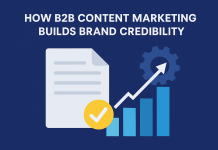Nowadays when having a strong online presence is necessary, Search Engine Optimization is an important strategy for B2B organizations looking to generate high-quality leads. Understanding the intricacies of B2B SEO can significantly enhance your online visibility and facilitate more effective communication with potential clients as businesses shift more and more toward online platforms.
This blog explores best practices that will improve your business’s B2B SEO efforts and eventually generate quality leads.
Understanding B2B SEO
B2B SEO includes a range of strategies designed to improve the search engine ranking of businesses that provide products or services to other businesses. Unlike B2C SEO, which targets individual consumers, B2B SEO focuses on reaching a specific audience that often engages in lengthy decision-making processes. A solid B2B SEO strategy not only increases brand visibility but also establishes authority and trust within your industry.
The Importance of B2B SEO
- Higher Quality Leads: B2B SEO helps attract visitors who are already interested in your products or services, resulting in higher conversion rates.
- Cost-Effectiveness: Compared to traditional marketing methods, SEO offers a more sustainable and cost-effective approach to lead generation.
- Long-Term Results: Unlike paid ads, which stop generating traffic once the budget is exhausted, SEO efforts can yield long-lasting benefits over time.
Conducting Keyword Research
Effective keyword research is the backbone of any successful B2B SEO strategy. Here’s how to conduct thorough keyword research:
- Use Keyword Research Tools:
- Tools like Google Keyword Planner, Ahrefs, and SEMrush can provide insights into search volume, competition, and related keywords.
- Identify Long-Tail Keywords:
- Long-tail keywords are phrases with three or more words that are highly specific. For example, instead of targeting “SEO,” a more effective keyword might be “B2B SEO strategies for lead generation.” These keywords usually attract a more qualified audience.
- Analyze Competitors:
- Examine the keywords that your competitors rank for. Identify gaps in their strategy that you can exploit to gain a competitive edge.
On-Page SEO Best Practices
A. Optimizing Website Content
Creating high-quality, informative content is essential for effective B2B SEO. Consider the following:
- Address Audience Pain Points: Focus on solving the problems your audience faces. Craft content that directly addresses their challenges and offers solutions.
- Natural Keyword Integration: Incorporate primary and secondary keywords organically throughout the content. Aim for a keyword density of 1-2% to avoid keyword stuffing.
- Visual Content: Use visuals such as infographics, charts, and videos to enhance understanding and engagement.
B. Meta Tags and Descriptions
Optimizing meta tags and descriptions can significantly impact your CTR. Follow these tips:
- Compelling Title Tags: Craft unique, descriptive title tags for each page. Include your primary keyword, and keep it under 60 characters for optimal display in search results.
- Engaging Meta Descriptions: Write concise, engaging meta descriptions that summarize the content. Aim for 150-160 characters and include a call to action.
C. Header Tags and Internal Linking
Utilizing header tags (H1, H2, H3) not only helps organize your content but also enhances readability. Internal linking, or linking to other relevant pages within your site, boosts SEO by:
- Improving Site Navigation: It helps users find related content and stay longer on your site.
- Distributing Page Authority: It signals to search engines which pages are important, potentially improving their rankings.
Technical SEO Considerations
Technical SEO is crucial for ensuring that search engines can effectively crawl and index your website. Focus on:
- Site Speed: A fast-loading site is critical for retaining visitors. Use tools like Google PageSpeed Insights to identify and fix speed issues.
- Mobile Optimization: Ensure your website is responsive and provides a seamless experience across all devices. With over 50% of web traffic coming from mobile, this is essential .
- Secure Connections (HTTPS): Using HTTPS not only secures data but also boosts your rankings, as Google favors secure sites .
Off-Page SEO Strategies
A. Building Quality Backlinks
Quality backlinks from reputable sites enhance your authority and improve your rankings. Consider these strategies:
- Guest Blogging: Write guest posts for industry-relevant blogs to earn backlinks and reach a new audience.
- Influencer Collaborations: Partner with industry influencers to broaden your reach and credibility.
- Social Media Engagement: Share your content on social platforms to increase visibility and attract natural backlinks.
B. Leveraging Social Media
Social media can significantly amplify your B2B SEO efforts:
- Content Promotion: Share blog posts, infographics, and other valuable content on platforms like LinkedIn and Twitter.
- Community Engagement: Participate in discussions and share insights in relevant industry groups. This positions you as a thought leader and drives traffic to your site.
Measuring SEO Success
To assess the effectiveness of your B2B SEO strategy, track key performance indicators such as:
- Organic Traffic: Monitor the number of visitors coming from search engines using tools like Google Analytics.
- Lead Conversions: Analyze how many visitors complete desired actions, such as filling out contact forms or signing up for newsletters.
- Bounce Rate: A high bounce rate may indicate that your content isn’t engaging or relevant to your audience.
For instance, a mid-sized software firm implemented a B2B SEO strategy focusing on long-tail keywords related to their niche. Within six months, they achieved a 50% increase in organic traffic and a 30% boost in lead conversions. This highlights the tangible benefits of a well-executed B2B SEO approach .
In conclusion, B2B SEO is a crucial component of any digital marketing strategy aimed at driving quality leads and enhancing online presence. By implementing the best practices outlined in this blog—conducting thorough keyword research, optimizing on-page elements, ensuring technical soundness, and leveraging off-page strategies—you can position your business for sustainable growth.
I hope you find the above content helpful. For more such informative content please visit B2B Reports.









